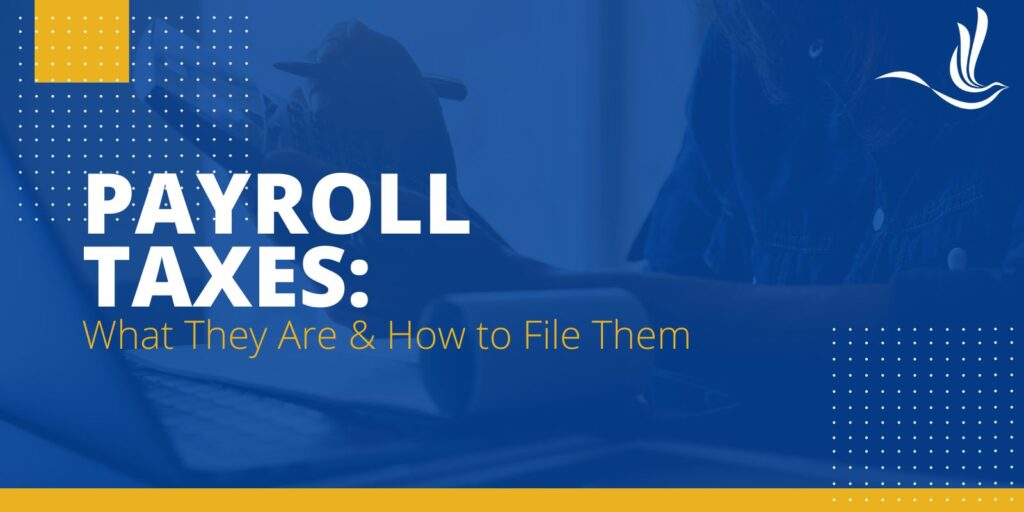
Payroll taxes play a crucial role in the financial ecosystem, serving as a vital source of revenue for governments while ensuring the proper funding of social security, Medicare, and other essential programs. For businesses, understanding payroll taxes is essential to remain compliant with tax regulations and avoid legal complications. In this article, we’ll delve into what payroll taxes are, who needs to file them, and the process of filing to help businesses navigate this complex aspect of financial management.
What Are Payroll Taxes?
Payroll taxes, also known as employment taxes, are taxes imposed on employers and employees based on their wages or salaries. These taxes fund various social insurance programs, including Social Security, Medicare, and workers’ compensation. and are mandated by federal and state governments. It’s important to note that payroll taxes are separate from income taxes, as they are specifically tied to employment income. You might’ve noticed deductions on your pay stubs labeled as MedFICA and FICA. These represent Social Security, Medicare, and FICA contributions. Federal unemployment tax (FUTA) is paid by employers only for unemployment benefits.
In 2024, the Social Security tax is 12.4%, with half paid by the employer and half by the employee. Medicare is taxed at 2.9%, with half paid by the employer and half by the employee. Higher earners with income over $200,000 or married couples filing jointly with incomes over $250,000 pay an additional Medicare tax of 0.9%. The FUTA tax rate is 6% on the first $7,000 paid to each employee during the year. However, the FUTA Tax Credit is worth up to 5.4% if you pay state unemployment tax (SUTA).
Who Needs to File Payroll Taxes?
Employers are primarily responsible for filing and remitting payroll taxes on behalf of their employees. This includes businesses of all sizes, whether they have a single employee or a large workforce. Additionally, self-employed individuals may be required to pay self-employment taxes to cover both the employer and employee portions of Social Security and Medicare.
Benefits of E-Filing Payroll Taxes
While you have the option of filing by paper, the IRS tends to respond faster to returns that are e-filed. Just as you would file an individual tax return, e-filing can prevent delays. E-filing is also much more convenient for making amendments to your return and tracking the status after you send it.
Paper returns can go missing, whether it’s through the mail or by getting lost in the huge backlog in the IRS office. In addition, any mistakes or missing forms would be much more difficult to catch and correct once you mail your return.
How to E-File Your Payroll Taxes
The IRS requires businesses to electronically pay payroll taxes through the Electronic Federal Tax Payment System (EFTPS). Smaller businesses may be able to pay them when filing their annual tax return. State payroll tax payments can vary, so be sure to check your state’s regulations.
Here are the steps to e-filing your payroll taxes.
- File Quarterly and Annual Tax Returns: Employers must file quarterly and annual payroll tax forms. The quarterly Form 941 reports income taxes, Social Security taxes, and Medicare taxes. If you are an agricultural employee, you will use Form 943, Employer’s Annual Federal Tax Return for Agricultural Employees. This form is due by January 31 of the year after you pay your workers’ wages.
- Submit FUTA: Complete Form 940, which reports employer’s annual Federal Unemployment Tax Act (FUTA) tax, by January 31. Employers may also be responsible for state unemployment tax (SUTA).
- Enroll in the Electronic Federal Tax Payment System (EFTPS): Paper check payments are not allowed. Employers must use EFTPS. However, keep in mind that it takes at least two weeks to accept EFTPS. Employers should give themselves plenty of time to enroll before payment due dates.
- Submit Tax Payments: Forms 940, 941, and 943 should have helped calculate the amount of taxes owed. Using your EIN, PIN, and password for EFTPS, you’ll make the correct tax payments to the IRS. Payments should be made by 8pm EST the day before they are due to avoid late payment penalties. Be sure you know your payment schedule. While small companies may owe on a monthly basis, large companies pay semiweekly.
Tax Help for Those Who Pay Payroll Taxes
Employers can find themselves in tough situations with the IRS if they do not properly deduct payroll taxes from their employees. In the end, it is the employers who are liable for any unpaid payroll taxes. In the worst cases, the IRS can fine, penalize, and even prosecute employers who are not compliant with tax law. Taxes can be very complicated and confusing, especially for businesses. In addition, tax law can change year to year. Staying up to date with the most recent laws is crucial. That’s why at Optima, we provide tax relief services for both individual and business taxes. Give us a call at (800) 536-0734 for a free consultation regarding your case. Optima Tax Relief is the nation’s leading tax resolution firm with over a decade of experience helping taxpayers with tough tax situations.
If You Need Tax Help, Contact Us Today for a Free Consultation